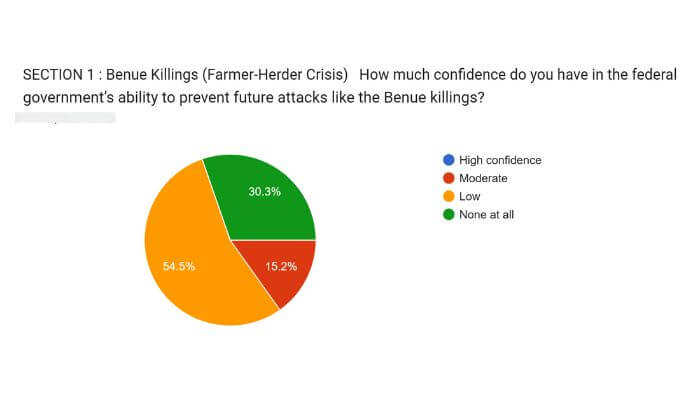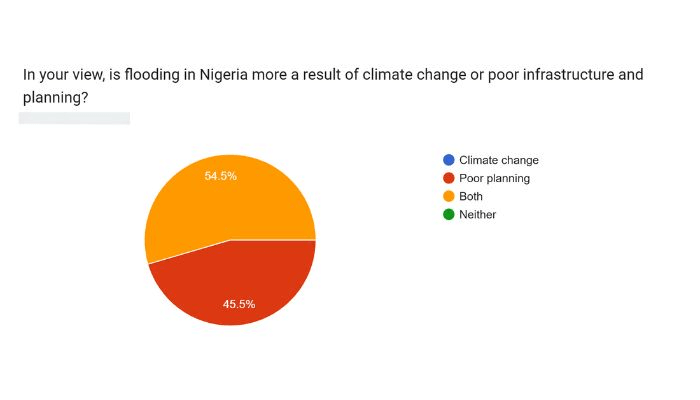A growing number of Nigerians no longer believe their government can protect them from violence, hunger, or provide them succour in the aftermath of natural disasters.
BusinessDay’s June TalkExchange poll gauged public opinion on the state of security, flood management, and food access. The results reveal widespread disillusionment and a demand for urgent action, capturing Nigerians’ views on three issues currently shaping public discourse: the killings in Benue, the Mokwa flood crisis, and the growing food insecurity across the country.
Regarding security, the responses were direct and critical. When asked how much confidence they had in the federal government’s ability to prevent future attacks like the recent killings in Benue, 54.5 percent said they had low confidence, while 30.3 percent said they had no confidence at all. Just 15.2 per cent expressed moderate confidence. None of the respondents expressed high confidence in the government’s capacity to prevent further violence.

The government’s response to the Benue crisis was also viewed unfavourably. 45.5 per cent of those surveyed said the government was “absent”, 30.3 percent described it as “delayed”, while 24.2 percent called it “reactive”. Again, no respondent believed the government acted proactively.
The majority of respondents believe this kind of state inaction is having a broader societal effect. 63.6 percent said they “strongly agree” that the government’s failure to respond decisively is normalising mass violence, and a further 27.3 percent agreed. Only 6.1 per cent disagreed, and 3 per cent strongly disagreed.
When asked who should take primary responsibility for preventing and responding to killings like those in Benue, 54.5 per cent pointed to the federal government. 33.3 percent placed the responsibility on state governments, while 9.1 per cent said security agencies should lead the response. Just 3 percent mentioned community leaders.
Read also: Survey: Economy is top concern as Nigerians speak on Tinubu’s reforms, 2027
Responses to the open-ended questions focused heavily on the need for systemic reform. Citizens called for the establishment of state police, stricter prosecution of offenders, nationwide bans on open grazing, and the professionalisation of local security agencies. One respondent said, “Until we have state police, these killings will continue. Governors are chief security officers only in name.”
On the issue of flooding, the poll found that Nigerians overwhelmingly blame government failure rather than climate change. When asked if Nigeria’s flood problem is more a result of climate change or poor planning, 45.5 per cent blamed poor planning outright, and 54.5 per cent said it was a combination of both. No respondent selected climate change alone.

Public perception of government preparedness was also low. 69.7 per cent said agencies were not prepared to manage floods. 15.2 per cent were unsure, 12.1 per cent said the agencies were “somewhat prepared,” and just 3 per cent said they were “very prepared.”
Responsibility for the impact of the Mokwa floods was spread across different levels of government, but the Niger State Government received the most blame, with 57.6 per cent holding it accountable. 27.3 per cent blamed the federal government, and 9.1 per cent named emergency management agencies. Only 6.1 per cent said no one should be blamed, calling it a natural occurrence.
The public also believes local communities have a role to play in reducing flood risk. 63.6 per cent said communities must take active preventive measures. 27.3 per cent supported collaboration with agencies. No one chose to rely solely on the government response.
In responses to open-ended questions, citizens identified corruption, lack of enforcement, unregulated building practices, and poor infrastructure as the major obstacles to effective flood management. One response stated, “Wrong application of ecological funds and wrong priorities are a major problem.” Another called for the “activation of flood emergency plans before the rains, not after.”
Food insecurity was also addressed in the survey. When asked about the leading cause of food insecurity in Nigeria, 69.7 per cent identified armed conflict. 21.2 per cent cited poor agricultural policy, and 9.1 per cent mentioned inflation. None of the respondents blamed climate change.
Regarding government food interventions, 57.6 percent said they were poorly managed. 36.4 per cent described them as not effective at all, while just 6.1 per cent said they were fairly effective. None considered the programmes to be very effective.
This lack of confidence also extended to food aid delivery. 57.6 per cent said they had low trust that government food aid reaches those who need it most. 39.4 percent had no trust. Only 3 per cent said they had moderate trust.
Asked how the availability and cost of food had changed over the past six months, 36.4 per cent said the situation had worsened, while 15.2 percent said it had severely worsened. 27.3 per cent said there had been no change, and 21.2 per cent said conditions had improved.
To tackle hunger, respondents recommended a return to secure farming conditions, improved logistics, support for mechanised agriculture, and reforms in the food distribution system. Some suggested targeted food imports, while others called for localised food production and market regulation. One respondent stated, “First solve the problem of herders-farmers conflict, then kidnapping and other security issues.”
Across the board, Nigerians are demanding urgent structural change. From security to food to flooding, the message from citizens is clear: the current approach is not working, and leadership at all levels must do more.
Take a look at the previous poll results.
Join BusinessDay whatsapp Channel, to stay up to date
Open In Whatsapp





